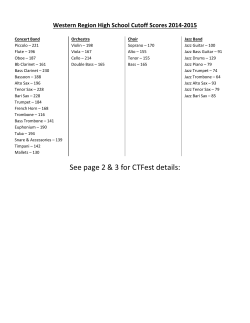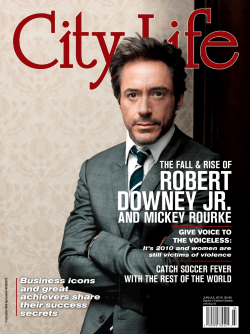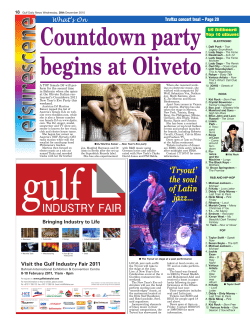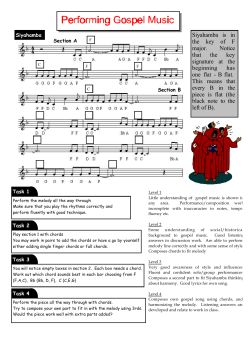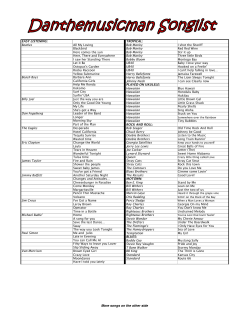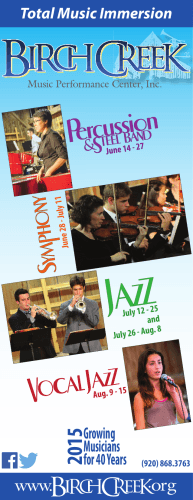
JAZZ LESSON NO. 2: Learn how to improvise jazz (without... strument!) S
2nd edition January 2014 DEAR FRIENDS, First of all: best wishes to all of you for the year 2014! Because of the holidays, this newsletter is a bit later than expected. A new year means new chances, also for the Groningen Student Big Band. That’s why we kicked off 2014 with a brand new website! Take a look at www.groningenstudentbigband.nl! In this newsletter, we’ll give away some tips and tricks for musicians who’d like to learn how to improvise. Furthermore, this newsletter edition contains an interview with David Rosenstock, our drummer. There are a lot of things to work on this year. Getting funds for the band, for instance, has the highest priority right now. We rely upon the help of sponsors in order to promote the band, acquire new music and develop new projects. This is what brings us to our next goal: the music projects. By the beginning of March, we’d like to start with a project called ‘Swing night’, a monthly gig at a Theatre in cooperation with a dancing school in Groningen, where people can come and dance to our swing music. Another project we’re working on is the ‘Cinema nights’ project, a series of gigs combined with old movies. We’ll keep you posted about these projects and its progress in the next newsletter. Please note: a lot of gigs haven’t been confirmed yet, so hopefully we have more upcoming gigs to announce next time! Facebook likes at this moment: 245 UPCOMING GIGS Thursday, 22/05 Music Matters Lunch concert @ Harmonie building RUG (Gron) Time: 12:00 Info & tickets Deze nieuwsbrief liever in het Nederlands? laat het ons weten via de mail! JAZZ LESSON NO. 2: Learn how to improvise jazz (without your instrument!) Simply put, improvisation means making something up as you go along. In jazz, it is when musicians perform a different interpretation each time they play the same tune. A tune is never played the exact same way twice, whether played by the same musicians or an entirely different group; the improvisation becomes its own musical dialogue between band members without any preconceived notion of what the final outcome will be. It’s a musical conversation. When jazz musicians improvise, they are playing the notes that they “hear” (imagine) in their mind; they “hear” these notes just a split second before they play them (just like when you are talking, you “hear” the words in your head just a split second before you say them. It happens so fast and so naturally that it seems simultaneous, but in actuality, the thought occurs a microsecond before the action). If you’d like to learn how to improvise Jazz, there’s so much information out there, that knowing where to start is a complete nightmare. That’s why we made a checklist to get you started learning a bit of jazz improvisation. Just simply go through the checklist, click on the text and images for more info and you’ll be well on your way to becoming a fluent jazz musician. This month, we’ll discuss the things to do without your instrument. Next month, we’ll pay attention to the things you can practice WITH your instrument. Things to do WITHOUT your instrument: 1. Listen to jazz. This sounds simple, but how much have you really listened? With the advent of Ipods that carry gigabytes of music, there’s no excuse not to be listening all the time. 2. Understand the jazz culture. There are many myths about jazz, and even more mysterious than the music are the players themselves. Pick up some autobiographies of some great jazz musicians and you’ll begin to understand what life was like for these people (for example: Miles Davis’s Autobiography, Count Basie’s Autobiography). Reading about jazz musicians is always fun and entertaining. 3. Understand chords, chord progressions, and chordtones from a theoretical and aural basis. You hear so much about how complicated jazz theory is that when people start to learn jazz, they think they have to learn a ton of theory. In actuality, there’s only a minimum amount of music theory required to understand jazz lines and progressions and the bulk of it has to do simply with chords. You need to understand how chords are built (major, minor, dominant, half-diminished, and diminished). A firm understanding of how to build these chords will allow you to branch out to modifications of these chords, including dominants with altered 5s and 9s. Make sure to think of each chord tone as a number in relation to the chord. A great way to start ingraining the structures of chords into your mind is visualizing them in your spare time. Again, this is all stuff you can start doing today even without your instrument! Equally if not more important to understanding chords, is to learn to actually hear chords and chord tones. We’ll come back to the understanding of chords later in the Jazz Lessons sections. 4. Understand ii Vs (two-five progressions) and how important they truly are. The ii V progression makes up the vast majority of chord changes within the jazz standard repertoire. Much of the successes or failures as improvisers come from being able to navigate this deceptively simple progression. They are extremely important to study. Next month we’ll continue the improvising lessons with the ‘Things to do WITH your instrument’ checklist. AN INTERVIEW WITH... David Rosenstock (DRUMMER) This month we interview David, our drummer from Germany. He studied at the Prins Claus Conservatory in Groningen and is currently pursuing his career in different bands and in teaching. You’re from Germany but you speak excellent Dutch. Where did you learn how to speak Dutch so fast? Thanks, besides a two-week language-course I tried my best to avoid using English and just learned on-the-go. I find it very rewarding to learn the local language and it makes many things much easier so I tried hard to learn it. Some Dutch friends were helping me a lot and correcting my mistakes. You just finished your studies at the conservatory. What do you do now? I am just continuing to practice and learn music. I like teaching so I am happy to have some drum students and I am looking for more. Besides the Groningen Student Big Band, I am playing with some other bands, both jazz and funk. At the same time I am looking for future options like master classes a and workshops or Master programs. Are there any bands or artists that inspire you musically? Well there are probably too many to name, but certainly the biggest influences are Michael Jackson, Keith Jarrett, The Roots, Sting, Jamiroquai, James Brown, WDR Big Band, Herbie Hancock, D'Angelo and so on... The GSBB is a semiprofessional band. What is your motivation to play in this band with not only professional musicians? When I was playing the first rehearsal I immediately liked the atmosphere in the band - everybody is really involved and there is a very good energy. I liked how the band and the conductor interact, always in a very productive way, being nice but at the same time focusing on real improvement. For me, the main thing about music is having a good atmosphere and people who are involved with the music and doing their best. Besides that, this band is very well organized! I was really impressed how this band sounds after only a few months and decided to contribute from my part- I am very much looking forward to future projects and many nice concerts! What is your musically guilty pleasure? “Gettin' Jiggy with it” If by Will Smith. you had to change drums for another instrument, what would that be? Probably the Bass – it has so much power to move the music but is yet subtle. I also love the Baritone sax. What is your favorite GSBB tune? The Peanut Vendor – because of the trumpet parts :) Who do you want to be interviewed next? Rob Spelberg, because I want to know his musically guilty pleasure. DID YOU KNOW… Warner Music collected over US$2 million in royalties in 2008 for public usage of the "Happy Birthday" song. None of The Beatles could read music. Barry Manilow didn’t write his song called ’I write the songs’. Leo Fender, the inventor of the Telecaster and Stratocaster, could not play guitar. Don’t you want to receive our mails anymore? Please, sign out for the newsletter HERE.
© Copyright 2025





